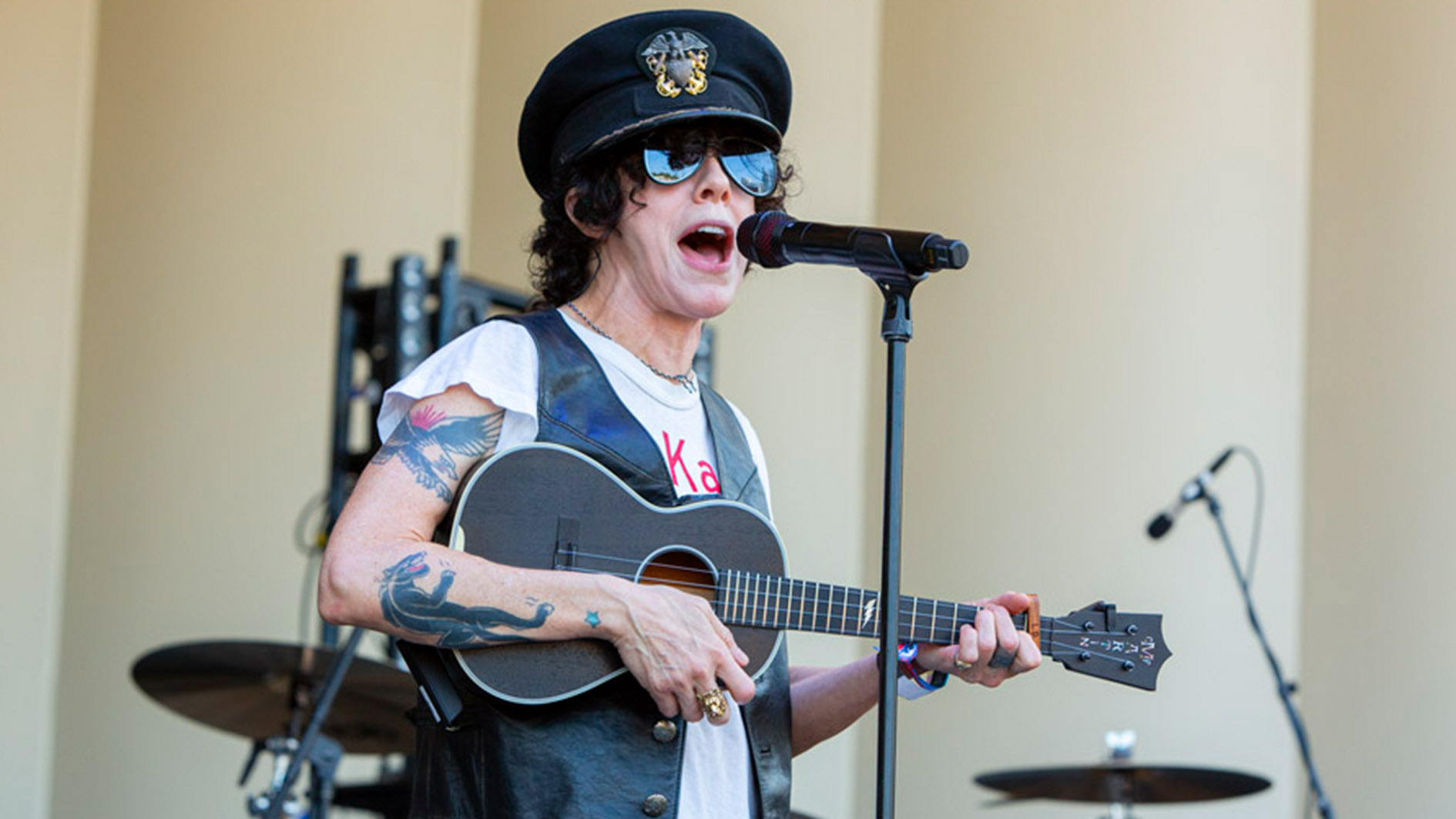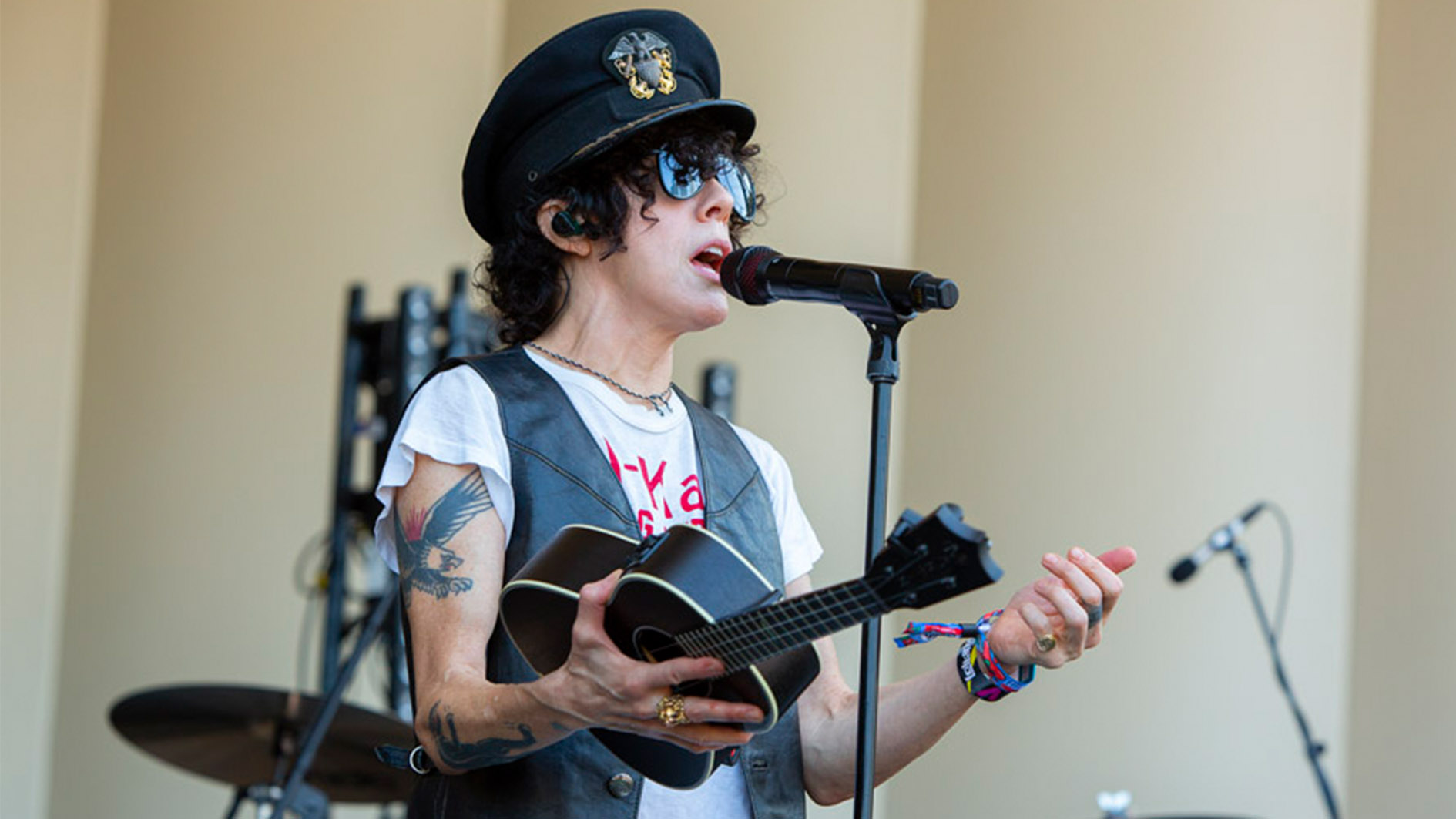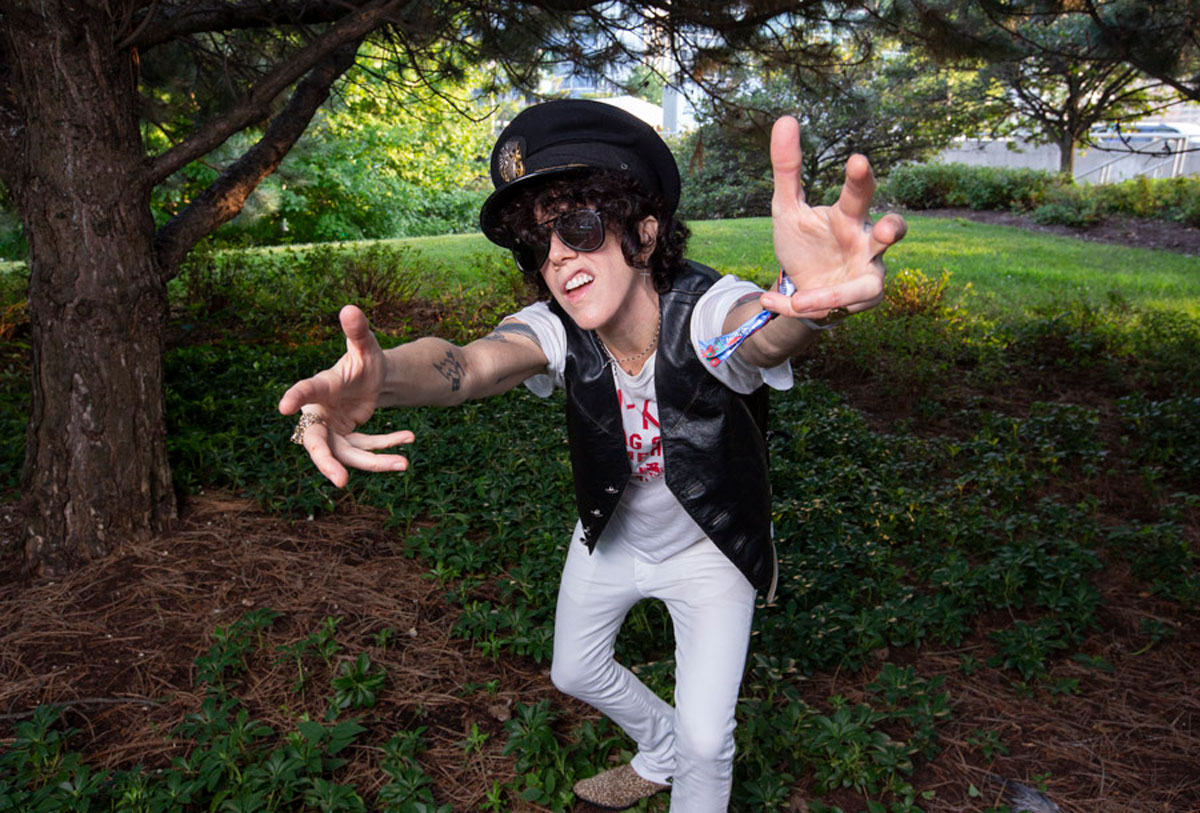LP: “The ukulele is a serious instrument and it has range – It doesn’t have to be cutesy”
The veteran New York singer-songwriter on why the ukulele is rock 'n' roll, the “life-affirming” nature of playing guitar, and the writing process behind her forthcoming sixth album, Churches

Songwriter LP, is, in her way, one of the most compelling songwriters in the world right now. She plays guitar (mostly acoustic), ukulele, croons like an opera singer and can entertain crowds of thousands, as she did recently at Lollapalooza.
But what makes an artist great is not necessarily their ability to shred or turn the proverbial amplifier up to 11. Rather, it’s how well they’re able to access those personal places and moments in their creative hearts and souls that resonate in big ways for their listeners. Really, it’s about human connection. And that’s what LP is so deft at.
Before she was releasing songs like Lost on You and earning millions of streams, LP was a songwriter-for-hire. She’s worked with giants, from Rihanna to the Backstreet Boys. During those occasions, she would sometimes remove herself from the recorded track and take her ukulele to a corner and strum it to come up with the best lyrics.
We caught up with LP to ask her about her history playing guitar and ukulele, how she wields it on stage (almost like a machine gun, at times) and how she considered the instruments when writing and recording her new, forthcoming record, Churches, which is out December 3.
When did you pick up your first guitar and what went through your head when you did?
“I always wanted to play guitar when I was a kid and my parents were like, ‘Ah, you’re not going to play it.’ I don’t know why. My father said, ‘You’re not going to play it.’ I was like, ‘Oh I’m not going to play it?!’ My father, I learned, was not one of those people who really – he wasn’t artistic. He played sports but he didn’t work out. He wasn’t a guy that stuck with something. And I am, clearly.
“In my life, I stick with things from my physical exercise to my playing to my singing. I am a student, I keep going. So, this motherfucker told me I wasn’t going to play guitar. So, I couldn’t get a guitar until I was, you know, probably late teenage years. Then I was in a band where the guitar player was threatened by me getting better at guitar.
Get The Pick Newsletter
All the latest guitar news, interviews, lessons, reviews, deals and more, direct to your inbox!
“So, it was kind of like a beatdown all the time, you know? [Laughs] Not to blame anybody else but myself, but I was discouraged from getting a guitar. And then it was slow going for me because it was very hard to join my being able to sing and play. I couldn’t do it together.”
It’s not easy at first…
“Yeah, I’m jealous of people that do it together and it’s just seamless – they don’t even think about it. Because when your brain is split and you try to join it again, it’s very difficult. Still sometimes it’s hard. But that was the biggest hassle for that and just feeling insecure about my playing always. When my artist career kind of got put on the back burner, I remember I’d always wanted to play the ukulele.
“I just remember I thought it was fun and portable and kind of off-the-cuff. There’s something about bringing a ukulele to a writing session over bringing a guitar where, you know, if you bring a guitar to a writing session, especially the way writing has been and was in 2009, there’s a lot of track shit, a lot of electronic shit, people using computers.
“When I was writing with my little band, we sat down with guitars. But then when you were going to writing sessions, you wouldn’t know who would be there. And then you’d have people who were insane guitar players, so they’d play whatever the fuck it was. But I remember bringing a ukulele because it was fun. It was a good conversation piece. I was just enjoying it.
“When I first got it, I wasn’t in a band anymore. So, it was just for me. When I first got it, I was on this thing called, ‘BeatlesSite.org’. It was just a Beatles website with, like, 100 songs.
“It was kind of interactive; it showed you all these Beatles songs with the chords simply. You could see the fingering of the chords. It was cool because I knew all the guitar chords but I was, like, ‘Oh shit, these are all different fingerings for ukulele.’

“So, I was like, ‘Ugh, this will be a pain in the ass!’ But when I started, I just got addicted. It was so fun. I was learning songs in like two seconds. Then I started writing these whistle ditties, just like bedroom ditties.
“While I was songwriting for other people, I would bring this guy along and just wander off when we were in the lyric section of the songwriting and I didn’t want to hear the track, or whatever it was, I would just play ukulele and go into the lyrical part for myself, just to clean my ears and my head.
“It just became my little friend, you know? Then I started composing songs for myself on it for fun, sort of. My new managers, who had signed me in 2010, after my record deals, they signed me as a writer, really, but they encouraged me to try and be an artist again, too. And ukulele, like I said, had just been my companion.
“I started writing songs for myself on it, some of the first being Into the Wild and Forever For Now, which became my Warner Brothers album. So, I switched to that and I’ve switched back. Now I play ukulele, I play Nashville-tuned guitar and I play regular acoustic guitar.
How do you approach the guitar or the ukulele when you’re on stage? There are videos where you hold your ukulele as if you’re wielding it, pointing it at the crowd.
I’m probably wrong, but I feel more rock ‘n’ roll with a ukulele than anyone!
“Yeah, as a prop! That’s the thing, I feel like the ukulele is fun because it doesn’t have a strap. So, you can just hold it and gesture with it. I’m a Martin ambassador and they make my ukuleles and they give me guitars, or whatever. But they hand-make my ukuleles.
“But I moved up to a tenor ukulele from a concert ukulele. And it’s a good thing I have fairly big hands because it’s a little harder to hold it the way I held the other one [Laughs] the concert’s a little smaller.
“But I like the way it looks and the way it sounds and feels. It’s just part of it. I mean, the whole thing of live music is the whole performance. It’s a show. So, it’s fun to make an instrument come across in a different way. When people hear about playing the ukulele, I think they picture some Hawaiian or some singer-songwriter bullshit. But I don’t think I play it like that.
“I’m probably wrong – please tell people I’m wrong – but I feel more rock ‘n’ roll with a ukulele than I think anyone! I feel confident to say I made two very quirky things – the ukulele and whistling – not seem as quirky and, I hope, not as silly as people try to make them.”
“Because I think people sometimes try to make the ukulele be a silly little happy instrument. But it’s like, no, fuck you! All you have to do is see that Jake Shimabukuro play. When he plays While My Guitar Gently Weeps and just shreds, you know -- ukulele is a serious instrument and it has range. It doesn’t have to be cutesy, you know?”
How did you get better in your career as a string player? Are you sitting in a room for 12 hours a day playing?
“No, I wish. I’m very lax with that. My guitar player, Alex, who is incredible, insane, that guy fucking practices hours and hours a day and it shows. I think, for me, when we get to playing live, there are a lot of balls in the air for me as far as what I’m thinking about when I’m on stage.
“But as far as being a front person and performing, I try to look as comfortable with and without a guitar or ukulele. There are some lead singers that look really awkward without a guitar and some that look awkward with a guitar. You’re always like, ‘Wow, they do not look comfortable!’ And I try to look comfortable with both and I feel comfortable, but I definitely try to make it so I feel free.”
Your singing voice is especially strong over Spanish guitar playing. Is that something you’ve noticed and, if so, why do you think that’s the case and what do you appreciate about that style of guitar playing?
“I think my voice, there’s a classic quality to it. And I don’t mean classic rock quality. I think I can sing and sound like, I don’t want to say it, because I’m not even trying to compliment myself by saying it, but I think I can sound like I’m from a long time ago. There’s not a current vibe to my voice. In fact, I think a lot of people don’t picture me looking how I look, either.
We're always trying to make sure that even if the song has an electronic or dancey feel, that it still has organic instruments and that my shit sounds like me
“When Lost on You came out, I think that was part of the one-two punch of it where people were like, ‘That’s what that person looks like? Jesus! That’s surprising.’ But I think that we just felt like to enhance that timeless quality, to try and use sounds and guitars that were a bit less on the nose for current pop status.
How did you approach your forthcoming LP, Churches, from a guitar or ukulele perspective? How did you think about the instruments as you wrote and produced the album?
“We used all my instruments, the ukuleles and guitars, in Nashville tuning. There are even some songs, like Everybody’s Falling In Love, which had more strings about six months, or less, before the record was done.
“But then we decided to go a little bit more toward using jangly guitars and some uke. We're always trying to make sure that even if the song has an electronic or dancey feel, that it still has organic instruments and that my shit sounds like me.
“Obviously, you don’t know if you’re going to keep your fans always. But I’d rather try to not lose fans that already like me. I’d like to keep them and push the envelope in ways that keep them on and help find some new fans too. So, I think we accomplished that on this record.”

What do you love most about the guitar, ukulele or simply the music you make with those instruments?
“During the pandemic, I was going to get a Covid test and I was near this guitar store in LA. So, I thought I’d go in there and I went right to the consignment area and I was looking at an old Gibson ukulele that was going to be more of a wall hanging than something that got much use. Then I said, ‘Eh, I don’t want that.’ Then I saw a Martin mandolin, which I thought was interesting.
“I’ve always wanted to play mandolin. But then I saw this classical guitar and I was really looking for a good classical guitar. It was this 1953 Martin, kind of like half-classic and half-steel. I didn’t get that at first – I got the mandolin first. I went home and the mandolin was just not [happening] – in the pandemic time when I was at home trying to just strum along while I watched TV, or whatever, it was like an ice pick in my ears, it was terrible.
“So, I want back and said, ‘Yo, you mind if I get that classical guitar instead? I think that’s more my speed, right now anyway.’ So, I got that guitar and it just – I don’t know, there’s something so soothing. I always knew the guitar was something soothing to just sit with and play. But a classical guitar just feels great. There’s just something that’s relaxing and life affirming of playing guitar.
“I always have all my guitars very accessible right there all the time. It’s something that drives me. I never know when I’m going to have an idea and I just feel like it’s part of the practice of feeling musical at all times, which in turns feeds my whole thing. From my psychological feelings to where I’m at with my career. So, I think guitar and ukulele are very life affirming. They just open things up for me.”
- Churches arrives December 3 via SOTA Records.
“I used to weigh my guitars and use the heaviest one. As I’ve got older and my back’s got worse, lighter guitars are definitely better”: Lee Malia’s Jackson signature completes a full circle 20 years in the making – and it redefines what a Jackson can be
“An esoteric boutique vibe, superb ergonomics and a powerful, unique preamp – Tobias is back”: Tobias Growler IV review

![John Mayer and Bob Weir [left] of Dead & Company photographed against a grey background. Mayer wears a blue overshirt and has his signature Silver Sky on his shoulder. Weir wears grey and a bolo tie.](https://cdn.mos.cms.futurecdn.net/C6niSAybzVCHoYcpJ8ZZgE.jpg)

![A black-and-white action shot of Sergeant Thunderhoof perform live: [from left] Mark Sayer, Dan Flitcroft, Jim Camp and Josh Gallop](https://cdn.mos.cms.futurecdn.net/am3UhJbsxAE239XRRZ8zC8.jpg)





